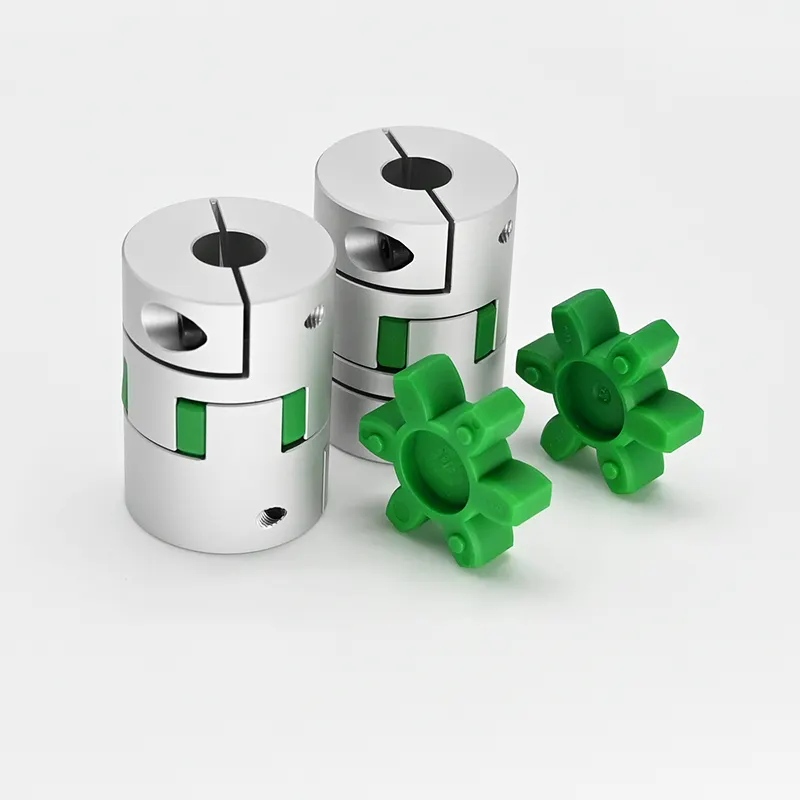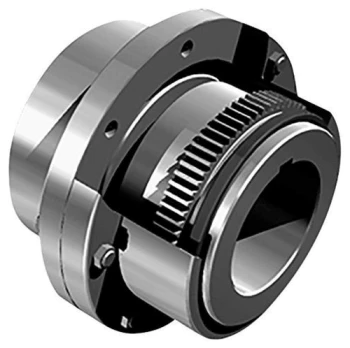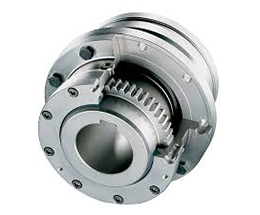Product Description
Telescopic flange long cardan shaft Coupling(SWP-E)
SWP partition profile bearing the cross shaft universal coupling products: replacement of bearings for, SWP type cardan design bearing split shaft bolt, suitable for hoisting and conveying machinery and other heavy machinery, connecting 2 different axis transmission shaft, axis angle of A~F type not more than 10 degrees, the G type is not greater than 5 degrees.
| Model | D mm |
Tn KN·m |
Tf KN·m |
β |
S mm |
mm | ||||||||
| D1 | D2 | D3 | E | E1 | b×h | h1 | L1 | n-d | ||||||
| SWP160E |
160 | 16 | 8 | ≤10 | 50 | 140 | 95 | 114 | 15 | 4 | 20×12 | 6 | 85 | 6-13 |
| SWP180E |
180 | 20 | 10 | ≤10 | 60 | 155 | 105 | 121 | 15 | 4 | 24×14 | 7 | 95 | 6-15 |
| SWP200E |
200 | 31.5 | 16 | ≤10 | 70 | 175 | 125 | 127 | 17 | 5 | 28×16 | 8 | 110 | 8-15 |
| SWP225E |
225 | 40 | 20 | ≤10 | 76 | 196 | 135 | 152 | 20 | 5 | 32×18 | 9 | 130 | 8-17 |
| SWP250E |
250 | 63 | 31.5 | ≤10 | 80 | 218 | 150 | 168 | 25 | 5 | 40×25 | 12.5 | 135 | 8-19 |
| SWP285E |
285 | 90 | 45 | ≤10 | 100 | 245 | 170 | 194 | 27 | 7 | 40×30 | 15 | 150 | 8-12 |
| SWP315E |
315 | 140 | 63 | ≤10 | 110 | 280 | 185 | 219 | 32 | 7 | 40×30 | 15 | 170 | 10-23 |
| SWP350E |
350 | 180 | 90 | ≤10 | 120 | 310 | 210 | 245 | 35 | 8 | 50×32 | 16 | 185 | 10-23 |
| SWP390E |
390 | 250 | 112 | ≤10 | 120 | 345 | 235 | 273 | 40 | 8 | 70×36 | 18 | 205 | 10-25 |
| SWP435E |
435 | 355 | 160 | ≤10 | 150 | 385 | 255 | 299 | 42 | 10 | 80×40 | 20 | 235 | 16-28 |
| SWP480E | 480 | 450 | 224 | ≤10 | 170 | 425 | 275 | 351 | 47 | 12 | 90×45 | 22.5 | 265 | 16-31 |
| SWP550E |
550 | 710 | 315 | ≤10 | 190 | 492 | 320 | 402 | 50 | 12 | 100×45 | 22.5 | 290 | 16-31 |
| SWP660E |
600 | 1000 | 500 | ≤10 | 210 | 544 | 380 | 450 | 55 | 15 | 90×55 | 27.5 | 360 | 22-34 |
| SWP640E |
640 | 1250 | 630 | ≤10 | 230 | 575 | 385 | 480 | 60 | 15 | 100×60 | 30 | 385 | 18-38 |
Detailed Photos
Packaging & Shipping
Company Profile
HangZhou CHINAMFG Machinery Manufacturing Co., Ltd. is a high-tech enterprise specializing in the design and manufacture of various types of coupling. There are 86 employees in our company, including 2 senior engineers and no fewer than 20 mechanical design and manufacture, heat treatment, welding, and other professionals.
Advanced and reasonable process, complete detection means. Our company actively introduces foreign advanced technology and equipment, on the basis of the condition, we make full use of the advantage and do more research and innovation. Strict to high quality and operate strictly in accordance with the ISO9000 quality certification system standard mode.
Our company supplies different kinds of products. High quality and reasonable price. We stick to the principle of “quality first, service first, continuous improvement and innovation to meet the customers” for the management and “zero defect, zero complaints” as the quality objective.
Our Services
1. Design Services
Our design team has experience in Cardan shafts relating to product design and development. If you have any needs for your new product or wish to make further improvements, we are here to offer our support.
2. Product Services
raw materials → Cutting → Forging →Rough machining →Shot blasting →Heat treatment →Testing →Fashioning →Cleaning→ Assembly→Packing→Shipping
3. Samples Procedure
We could develop the sample according to your requirement and amend the sample constantly to meet your need.
4. Research & Development
We usually research the new needs of the market and develop new models when there are new cars in the market.
5. Quality Control
Every step should be a particular test by Professional Staff according to the standard of ISO9001 and TS16949.
FAQ
Q 1: Are you a trading company or a manufacturer?
A: We are a professional manufacturer specializing in manufacturing
various series of couplings.
Q 2:Can you do OEM?
Yes, we can. We can do OEM & ODM for all customers with customized PDF or AI format artwork.
Q 3:How long is your delivery time?
Generally, it is 20-30 days if the goods are not in stock. It is according to quantity.
Q 4: Do you provide samples? Is it free or extra?
Yes, we could offer the sample but not for free. Actually, we have an excellent price principle, when you make the bulk order the cost of the sample will be deducted.
Q 5: How long is your warranty?
A: Our Warranty is 12 months under normal circumstances.
Q 6: What is the MOQ?
A: Usually our MOQ is 1pcs.
Q 7: Do you have inspection procedures for coupling?
A:100% self-inspection before packing.
Q 8: Can I have a visit to your factory before the order?
A: Sure, welcome to visit our factory.
Q 9: What’s your payment?
A:1) T/T.
♦Contact Us
Web: huadingcoupling
Add: No.11 HangZhou Road,Chengnan park,HangZhou City,ZheJiang Province,China
/* January 22, 2571 19:08:37 */!function(){function s(e,r){var a,o={};try{e&&e.split(“,”).forEach(function(e,t){e&&(a=e.match(/(.*?):(.*)$/))&&1

Can Industrial Couplings Accommodate Varying Torque and Speed Requirements in Machinery?
Yes, industrial couplings are designed to accommodate varying torque and speed requirements in machinery. Couplings play a crucial role in transmitting power between connected shafts while allowing for some degree of flexibility and compensation for misalignment. They come in different types and configurations, each tailored to specific applications and operating conditions.
Accommodating Varying Torque Requirements:
Industrial couplings are available in a wide range of sizes and designs, allowing them to handle a broad spectrum of torque capacities. The torque capacity of a coupling depends on factors such as the coupling’s material, size, and construction. For heavy-duty applications with high torque requirements, couplings like gear couplings or grid couplings are suitable choices. On the other hand, elastomeric couplings or diaphragm couplings are commonly used for applications with lower torque demands.
Furthermore, some couplings, such as torque-limiting couplings or overload couplings, are designed to protect machinery from sudden torque spikes or overloads. These couplings disengage temporarily when the torque exceeds a preset limit, preventing damage to the machinery.
Accommodating Varying Speed Requirements:
Industrial couplings can also handle varying speed requirements encountered in different machinery setups. The coupling’s speed capability is influenced by factors such as the material, design, and balancing. For high-speed applications, couplings like flexible disc couplings or metal bellows couplings are commonly used due to their excellent balance characteristics and ability to dampen vibrations at high speeds.
Additionally, some couplings, such as variable-speed couplings, can actively adjust their characteristics to match changing speed requirements. These couplings offer flexibility in power transmission and can optimize efficiency across a wide range of operating speeds.
Customization for Specific Requirements:
Industrial couplings can be customized or selected with specific torque and speed requirements in mind. Manufacturers often provide technical support to engineers and designers to help them choose the most suitable coupling for their applications. By considering factors like operating conditions, load profiles, and the machinery’s torque-speed characteristics, engineers can select or design couplings that precisely match the requirements of the machinery.
In conclusion, industrial couplings are versatile and can accommodate varying torque and speed requirements in machinery. Proper selection and design of the coupling are essential to ensure efficient power transmission, longevity of the machinery, and overall system performance.

Are there any Industry Standards or Regulations Governing the Use of Industrial Couplings?
Yes, there are industry standards and regulations that govern the use of industrial couplings to ensure their safety, performance, and reliability. These standards are developed and maintained by recognized organizations and governing bodies to establish best practices and requirements for the design, manufacturing, installation, and operation of couplings. Some of the prominent standards and regulations include:
- American National Standards Institute (ANSI): ANSI provides standards for couplings in various industries, including ANSI B11.19 for safety requirements in mechanical power presses and ANSI B15.1 for couplings used in general machinery.
- International Organization for Standardization (ISO): ISO publishes standards related to couplings, such as ISO 14691 for torsionally flexible couplings, ISO 10001 for industrial couplings used in general applications, and ISO 28927 for couplings used in hand-held power tools.
- American Petroleum Institute (API): API issues standards for couplings used in the oil and gas industry, such as API 610 for centrifugal pumps and API 671 for special purpose couplings.
- European Committee for Standardization (CEN): CEN develops European standards, including EN 14492-2 for safety requirements in cranes – power driven winches – part 2: load limiting devices and EN 15592 for torsionally flexible couplings.
- Occupational Safety and Health Administration (OSHA): In the United States, OSHA sets guidelines for safe working conditions, and some of its regulations apply to couplings used in industrial machinery to protect workers from potential hazards.
- Machine Directive (EU): The Machine Directive is a European Union regulation that establishes safety requirements for machinery, including couplings used in industrial equipment sold within the EU member states.
These standards and regulations cover various aspects of industrial couplings, including their materials, design, load capacity, torque ratings, and safety features. Compliance with these standards ensures that couplings are designed and manufactured to meet specific performance criteria and are safe for use in industrial applications.
Manufacturers and users of industrial couplings should be aware of the relevant standards and regulations applicable to their specific industries and regions. Adhering to these standards not only ensures regulatory compliance but also helps in maintaining a high level of quality and reliability in industrial processes, leading to increased safety and efficiency.

What is Industrial Coupling, and How Does It Work in Mechanical Systems?
In mechanical systems, an industrial coupling is a device used to connect two shafts together to transmit torque and motion from one shaft to the other. Couplings are essential components that enable the efficient transfer of power between rotating machinery while accommodating various operating conditions and misalignments. They play a crucial role in connecting motors, engines, gearboxes, and other equipment within industrial applications.
The primary function of an industrial coupling is to join two shafts in such a way that they can rotate together while allowing some degree of flexibility to accommodate misalignment, vibrations, and other dynamic forces. This flexibility is vital in preventing excessive stress and wear on the connected machinery, as well as mitigating the risk of premature failures.
There are various types of industrial couplings available, each designed for specific applications and operating conditions. Some common types of industrial couplings include:
- 1. Diaphragm Couplings: Diaphragm couplings, as discussed in previous answers, use a thin flexible diaphragm to transmit torque between the shafts. They can accommodate misalignments and dampen vibrations, making them suitable for various industrial applications.
- 2. Gear Couplings: Gear couplings use gear teeth to transmit torque and are known for their high torque capacity and rigid construction. They are commonly used in heavy-duty applications, such as steel mills and mining equipment.
- 3. Grid Couplings: Grid couplings use a grid of spring-like elements to transmit torque. They are versatile and can absorb shock loads, making them suitable for applications with varying loads and high shock forces.
- 4. Jaw Couplings: Jaw couplings use elastomeric elements to connect the shafts and are known for their simplicity and ease of installation. They are commonly used in small to medium-sized machinery.
- 5. Disc Couplings: Disc couplings use thin metal discs to transmit torque and compensate for misalignments. They are often used in precision applications and systems that require low backlash.
Regardless of the specific type, the working principle of an industrial coupling involves connecting the shaft ends and ensuring a firm grip between them. When torque is applied to one shaft, the coupling transmits that torque to the other shaft, causing both shafts to rotate together at the same speed. The coupling’s design allows for some degree of flexibility, which permits the shafts to compensate for misalignments, axial movements, and vibrations. This flexibility helps protect the connected equipment from stress and damage, promoting smooth operation and extending the lifespan of the machinery.
In summary, industrial couplings are critical components in mechanical systems that facilitate the transfer of torque and motion between rotating shafts. They provide flexibility, misalignment compensation, and vibration dampening, making them essential for reliable and efficient power transmission in various industrial applications.


editor by CX 2024-03-11
